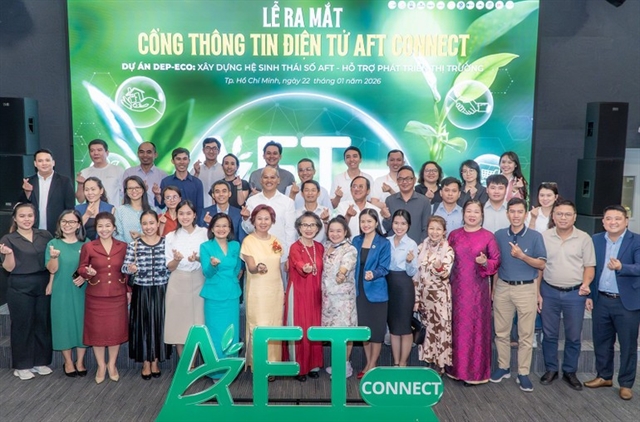 Society
Society


|
| Teacher Ngô Quý Cẩn, secretary of the Youth Union at Trần Nguyên Hãn High School, guides students on effective use of online applications. — VNA/VNS Photo Minh Thu |
HẢI PHÒNG — On a crisp November morning in Hải Phòng City, the assembly hall of Trần Nguyên Hãn High School buzzed with energy as nearly 2,000 students took their seats. Police officers, cybersecurity experts and youth leaders prepared to deliver a message that has never felt more urgent: ‘You are not alone online’.
For years, schools and youth organisations across Hải Phòng City have quietly built programmes to help young people navigate the digital world. But as online scams, manipulation and cyber exploitation increasingly target teenagers, the city’s youth organisations have shifted into high gear, introducing deeper, more specialised training in digital skills and online safety.
At Trần Nguyên Hãn High School, one of the city’s most active pioneers in digital literacy, the Youth Union partnered with the Hải Phòng Police to launch a schoolwide event supporting the national campaign ‘Không một mình’ (Not Alone), a Ministry of Public Security initiative aimed at protecting children and teenagers from online luring, manipulation and trafficking.
During the event, police officers unpacked two critical topics: how cybercriminals trick and manipulate young people, and how students can strengthen their digital security in an era of constant connectivity. Students also acted out scenes depicting online scams, an activity that drew laughter at first, then quiet murmurs as they recognised how easy it could be to fall into a trap.
Cybersecurity specialist Ngô Minh Hiếu, now director of the National Cybersecurity Monitoring Centre, spoke to the students with unusual candour. He shared stories, warning signs and techniques to identify online fraud – lessons he said every young person must learn to protect themselves.
For 12th grader Trần Vũ Như Ngọc, the programme was not just educational, but empowering.
“It helps us make sense of the traps that are getting more sophisticated every day,” she said. “It teaches us how to find safe, useful information online and reminds us to protect our personal data.”
Building a digital-savvy generation
Behind the scenes, Trần Nguyên Hãn’s Youth Union has spent nearly a decade refining its approach to digital education.
Teacher Ngô Quý Cẩn, secretary of the school’s Youth Union, recalls the early years, when social media exploded among students.

|
| Students at Trần Nguyên Hãn High School in Hải Phòng City learn about the “Not Alone” campaign. — VNA/VNS Photo Minh Thu |
“From 2016 to 2020, most students were online but did not always know how to share information responsibly,” he explained. “We created the school’s official Facebook page to counter misinformation and to communicate with students and parents. It became an important channel to spread positive stories and strengthen the school community.”
By 2020, as artificial intelligence (AI) tools emerged, the school adapted once more. It launched the Smart and Talented Team competition, in which students used platforms like Gamma to organise information and support learning.
As AI surged into mainstream use, the school introduced workshops on applying AI for research, creativity and skill-building. One standout activity was a storytelling contest about President Hồ Chí Minh, in which students used AI to generate videos, graphics, audio and narration, producing professional-quality projects.
To teacher Cẩn, AI is not a passing trend but a lifelong tool.
“AI helps students learn more efficiently and expand their knowledge,” he said. “But they need to understand how to use it responsibly and safely,” said Cẩn.
Preparing for an AI future
Teenagers tend to adopt new technologies quickly, but that same curiosity can leave them vulnerable. Recognising this, the Hải Phòng Youth Union has become a major force in strengthening digital awareness across the city.
According to Nguyễn Tiến Mạnh, deputy secretary of the Hải Phòng City Youth Union, local youth organisations have delivered nearly 1,000 digital-skills training sessions and built 725 digital literacy teams involving almost 15,000 young volunteers. These teams lead community training on safe internet practices and how to respond to online emergencies.
Major citywide initiatives such as the competitions 'Hải Phòng Digital Citizens: Smart Use, Safe Living' and 'Youth Digital Transformation' put young people in active roles as guides, mentors and advocates for online safety.
Workshops across high schools, universities and vocational centres train students to evaluate online information, recognise scams, protect personal data and use social media respectfully. Increasingly, the curriculum also includes AI literacy: using AI for research, presentations, translation and even virtual reality exploration of heritage sites.
These efforts, Mạnh explained, create a protective barrier against modern threats such as online kidnapping scams, financial fraud and extortion. They also prepare Hải Phòng’s young people for a labour market shaped by automation and advanced technologies.
As AI evolves at lightning speed, Hải Phòng’s youth organisations are racing to keep students informed and safe. The Youth Union is developing a standardised guide on responsible AI use covering data rights, evaluating AI-generated information and practising critical thinking.
Schools will be encouraged to create AI clubs and forums where students can experiment with tools, share projects and participate in AI-based learning activities. The Youth Union also plans to collaborate with tech companies, universities and research centres to offer advanced training and competitions aimed at discovering young talent in high-tech fields.
At the same time, the organisation will reinforce digital ethics, cybersecurity awareness and strategies for avoiding online risks, ensuring that young people approach the digital world confidently and responsibly.
With consistent innovation and strong leadership, Hải Phòng’s Youth Union is shaping a generation that can thrive in the digital era, not just as consumers of technology, but as responsible creators and informed citizens.
By equipping students with digital literacy, AI skills and online safety awareness, these programmes are helping young people learn, create, connect and protect themselves in an increasingly complex technological world.
Their efforts are building more than competence. They are building confidence.
And as Hải Phòng moves forward in its digital transformation, its young citizens are emerging as the city’s most dynamic, forward-looking force, ready to learn, adapt and lead. — VNS




